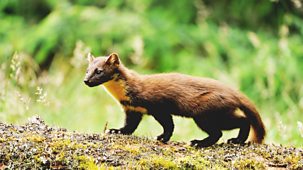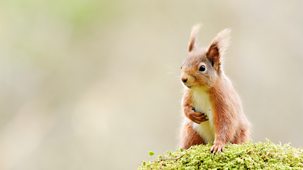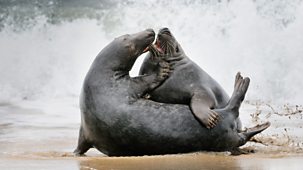
Series 1: Episode 3
The Highlands are a vast landscape covering much of Scotland. Dominated by mighty hills, glens, lochs, rivers and forests, it’s a landscape that has been heavily altered by people and climate. Once, a great forest covered much of this land, but little now remains.\n\nIn the Central Highlands lie the Cairngorms, a vast plateau where Scotland’s greatest Arctic-alpine environment can be found and home to Scotland’s only free-roaming reindeer herd. For thousands of years, reindeer roamed these hills before eventually being lost due to hunting and climate pressures. The herd was reintroduced in the 1960s and, each spring, it is joined on the high tops by a true Highland specialist - the dotterel. These trusting little birds return from North Africa to breed, flitting around the melting snow patches in search of food. For the very first time, we see their breeding behaviour captured on camera.\n\nIn the glen below, we find the largest remaining fragment of the great wood of Caledon. This special forest is among the last places that some rare species can be found, including the critically endangered capercaillie. Huge wood ant nests are seen dotted throughout the forest as thousands of workers gather in the branches of the Scots pines above. The ants range is much reduced from the past, fragmented throughout the landscape like the forest they depend on for survival.\n\nHidden in the roof of an abandoned cottage, we find a female pine marten raising a family of her own. These agile predators are helping out the local red squirrels by preying on the larger invasive grey squirrel. \n\nFurther north, in the Moray Firth, a great migration is under way as Atlantic salmon continue their journey to the spawning grounds. However, obstacles lie in their way, as in the estuary, bottlenose dolphins patrol the tidal rip at Chanonry Point, while further upstream, great waterfalls block their path. Salmon have decreased massively in the last few decades, with habitat degradation, rising sea and river temperatures, increased pollution and overfishing all contributing to their plight.\n\nGatherings take place throughout the Highlands as people come out to celebrate the history and culture of the landscape, while in the hills beyond, the black grouse lek takes place. This mating ritual involves the males gathering each morning to fight and display, hoping to impress the watching females. Their numbers are down, but it is hoped that woodland recovery will start to turn the tide. \n\nWinter can be brutal in the Highlands, with snow falling and temperatures dropping into the -20s. In this tough weather, mountain hares are seeking shelter in which to wait out the weather. Nearby red deer are being forced off the hillsides and into the forest in search of food, as the snow becomes too deep to dig through. These animals are hardy and have evolved to cope with such conditions. However, not all will survive the weather, and some will provide a welcome meal for apex predators. \n\nSnow is falling less frequently and lying for less time than in past winters, and a warmer and wetter Highlands will look quite different, posing even greater challenges for some. But there is hope for the landscape here as habitats are restored, with woodland and peatland beginning to show signs of recovery.
Source: BBC 2
Most recent episodes of Scotland - The New Wild
Scotland - The New Wild
Series 1: Episode 3
The Highlands are a vast landscape covering much of Scotland. Dominated by mighty hills, glens, lochs, rivers and forests, it’s a landscape that has been heavily altered b ...
13-11-2024
BBC 2
Scotland - The New Wild
Series 1: Episode 2
More than 80 per cent of Scotland’s population live in the Lowlands, a vast swathe of the country stretching from Aberdeenshire in the north east to the border with Englan ...
07-11-2024
BBC 2
Scotland - The New Wild
Series 1: Episode 1
Nearly 800 islands lie off the coast of Scotland, and these are some of the most biodiverse places in the country where the mix of low intensity agriculture, wild spaces and a d ...
06-11-2024
BBC 2
Most popular episodes of Scotland - The New Wild
Scotland - The New Wild
Series 1: Episode 1
Nearly 800 islands lie off the coast of Scotland, and these are some of the most biodiverse places in the country where the mix of low intensity agriculture, wild spaces and a d ...
06-11-2024
BBC 2
Scotland - The New Wild
Series 1: Episode 2
More than 80 per cent of Scotland’s population live in the Lowlands, a vast swathe of the country stretching from Aberdeenshire in the north east to the border with Englan ...
07-11-2024
BBC 2
Scotland - The New Wild
Series 1: Episode 3
The Highlands are a vast landscape covering much of Scotland. Dominated by mighty hills, glens, lochs, rivers and forests, it’s a landscape that has been heavily altered b ...
13-11-2024
BBC 2



